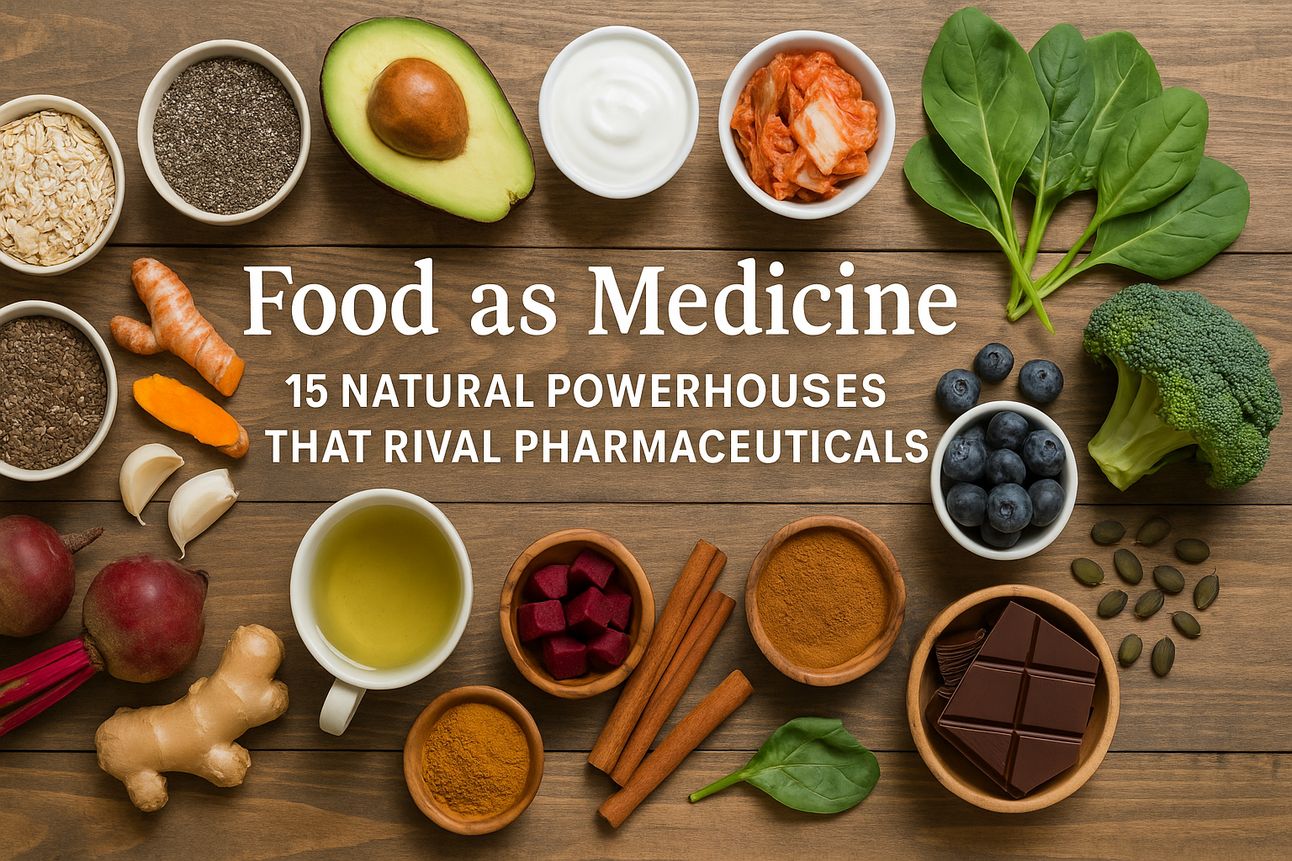- 40-something
- Posts
- Everyday foods to use as medicine
Everyday foods to use as medicine
15 natural powerhouses that rival pharmaceuticals.
They say, “Let food be thy medicine,” and after years of diving into nutrition, wellness, and holistic healing, I’ve found this ancient wisdom to be true on so many levels. In our fast-paced, prescription-happy world, we often overlook the power of everyday foods—many of which are clinically proven to be just as (if not more) effective than pills.
Below is my go-to list of foods that double as natural medicine. These aren’t just trendy superfoods—they're backed by science, and I’ll share how they work, how much to eat, and what they can help with.

1. Garlic (1–2 raw cloves/day)
What it helps: High blood pressure, cholesterol, immune function.
How it works: Garlic contains allicin, a compound with antibiotic, antifungal, and cholesterol-lowering properties. Studies show regular garlic consumption can reduce systolic blood pressure by up to 10 mmHg—on par with some medications.
2. Turmeric (with black pepper) (500–1,000 mg curcumin/day or 1 tsp turmeric + pinch of pepper)
What it helps: Inflammation, joint pain, brain health.
How it works: Curcumin, turmeric’s active compound, is a potent anti-inflammatory—comparable to over-the-counter NSAIDs. Black pepper increases absorption by 2,000%.
3. Ginger (1–2 grams/day fresh or dried)
What it helps: Nausea, digestion, inflammation.
How it works: Gingerol, the main bioactive compound, helps speed up gastric emptying and reduces nausea and bloating. It’s also been shown to reduce DOMS (delayed-onset muscle soreness) after exercise.
4. Oats (1 cup cooked/day)
What it helps: Cholesterol levels, heart health.
How it works: Oats contain beta-glucan, a soluble fibre that binds cholesterol in the gut. Eating oats daily can lower LDL (bad cholesterol) by 5–10%.
Note: Oats are a carbohydrate and will spike blood sugar. Always pair oats with a protein, or eat your protein first.
5. Chia seeds (1–2 tbsp/day)
What it helps: Blood sugar, digestion, energy.
How it works: Loaded with fibre, protein, omega-3s, and minerals, chia seeds slow glucose absorption, improve satiety, and support gut health.
6. Beets (1/2–1 cup roasted or juiced/day)
What it helps: Blood pressure, stamina, circulation.
How it works: High in nitrates, beets convert to nitric oxide in the body, helping dilate blood vessels and improve oxygen delivery—similar to meds for hypertension or performance enhancers.
7. Blueberries (1/2–1 cup/day)
What it helps: Cognitive function, oxidative stress, blood sugar.
How it works: Packed with anthocyanins and antioxidants, blueberries improve memory and reduce DNA damage. They’ve been compared to prescription memory boosters in some studies.
8. Fermented foods (kefir, kimchi, sauerkraut, yogurt) (1/2 cup/day)
What it helps: Gut health, immunity, mood.
How it works: Probiotics in fermented foods help balance gut flora, which affects everything from digestion to brain chemistry (hello, serotonin production!).
9. Green tea (matcha or brewed) (2–3 cups/day)
What it helps: Metabolism, mental alertness, inflammation.
How it works: EGCG, a catechin in green tea, is a powerful antioxidant that helps fight cancer cells, burn fat, and reduce oxidative stress.
10. Leafy greens (spinach, kale, swiss chard) (1–2 cups/day)
What it helps: Eye health, bone strength, detox.
How it works: Rich in folate, calcium, and magnesium, greens support everything from DNA repair to lowering homocysteine—a risk factor for heart disease.
11. Broccoli & cruciferous veggies (1 cup steamed/day)
What it helps: Hormonal balance, cancer prevention.
How it works: Sulforaphane and other compounds boost liver detoxification pathways and balance estrogen, helping reduce the risk of hormone-sensitive cancers.
12. Pumpkin seeds (1–2 tbsp/day)
What it helps: Sleep, anxiety, testosterone.
How it works: High in magnesium and zinc, these seeds support hormone production and nervous system function. Great natural support for insomnia and PMS too.
13. Dark chocolate (70% or more) (20–30 grams/day)
What it helps: Mood, blood flow, insulin sensitivity.
How it works: Flavanols in dark chocolate relax blood vessels, improve blood sugar control, and increase serotonin levels—naturally boosting your mood.
14. Avocados (1/2 avocado/day)
What it helps: Inflammation, cholesterol, satiety.
How it works: Full of monounsaturated fats and potassium, avocados help lower LDL and keep you full—reducing the need to snack on processed foods.
15. Cinnamon (1/2–1 tsp/day)
What it helps: Blood sugar regulation
How it works: Cinnamon improves insulin sensitivity and slows the breakdown of carbohydrates in the gut, working similarly to some diabetes medications.
Food can be medicine—but like any prescription, dosage and consistency matter. Most of these natural powerhouses won’t work overnight, but over time, their impact is profound. They also come without side effects (unless you overdo it), and they nourish you on every level.
Whether you're trying to avoid meds or just want to upgrade your health naturally, start by adding a few of these into your daily meals. The best part? They’re delicious.
Note: Always consult a doctor before replacing any prescription medication with dietary alternatives.
Administer your daily dose. Yum!
Umayya xx